How Can Today Be Compared to the Day of the Book of Esther
For Russians, classical literature is more than a way to learn their language or to pass the time. Some classics that are taught at schoolhouse play an of import part in forming the nation's cultural identity, and Russians frequently refer to them when making comparisons with similar situations, to narrate a person, to talk virtually beloved or hate, or just to utilise an idiom or make jokes. Every Russian will understand the reference considering anybody read the same books at school. Russian federation Beyond has compiled a list of the nearly important literary works, and if you read them all, so you'll meliorate empathise the Russian mentality.
1. The Minor, by Denis Fonvizin
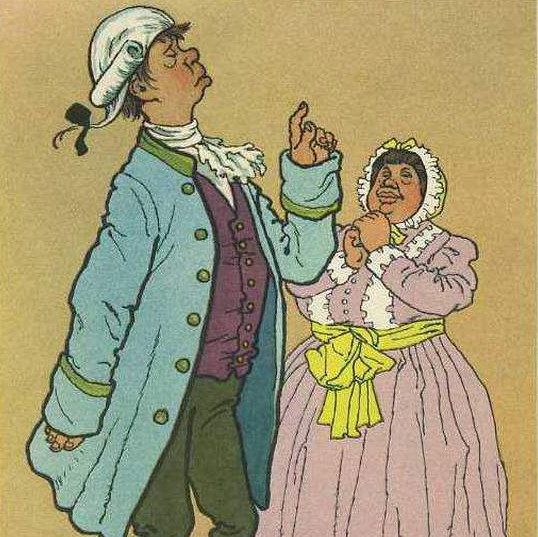
Catherine the Cracking prohibited Fonvizin to publish other literary works, which was the toll paid for his biting satire on Russian life.
G.O.Valk
Quotes from the 18th century comedy, The Small, which is Denis Fonvizin'southward most remarkable satirical work, quickly became a source of many idioms and proverbs in Russian literature and linguistic communication. The main hero, Mitrofanushka, is a selfish and uneducated member of the gentry, and he's the master target of Fonvizin's wit. Presently later on The Pocket-size's advent in 1783 on Moscow's theatrical scene, the comedy was an instant hit. At the aforementioned fourth dimension, Catherine the Smashing prohibited Fonvizin to publish other literary works, which was the price paid for his biting satire on Russian life.
2. Woe from Wit, by Alexander Griboyedov
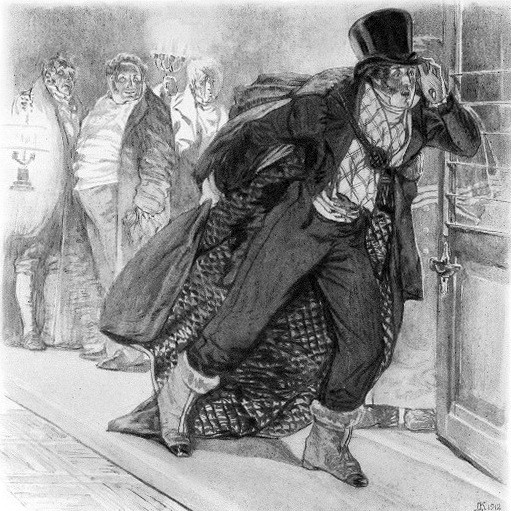
The author never saw Woe from Wit published.
Public Domain
A diplomat and playwright,Alexander Griboyedoventered the history of Russian literature just as author of one play, Woe from Wit. Monologues by this masterpiece'due south master hero, Chatsky, are frequently learned by middle at school. This xixthursday century play shows the disharmonize faced by an educated person, unable to curry favor with a hypocritical club. Completed in 1824, the play was published only in 1833 considering of the land censor. The author, however, never saw Woe from Wit published. As ambassador to Persia, Griboyedov was murdered in 1829 at the historic period of anile 34 during an anti-Russian riot in Tehran.
3. Eugene Onegin, past Alexander Pushkin
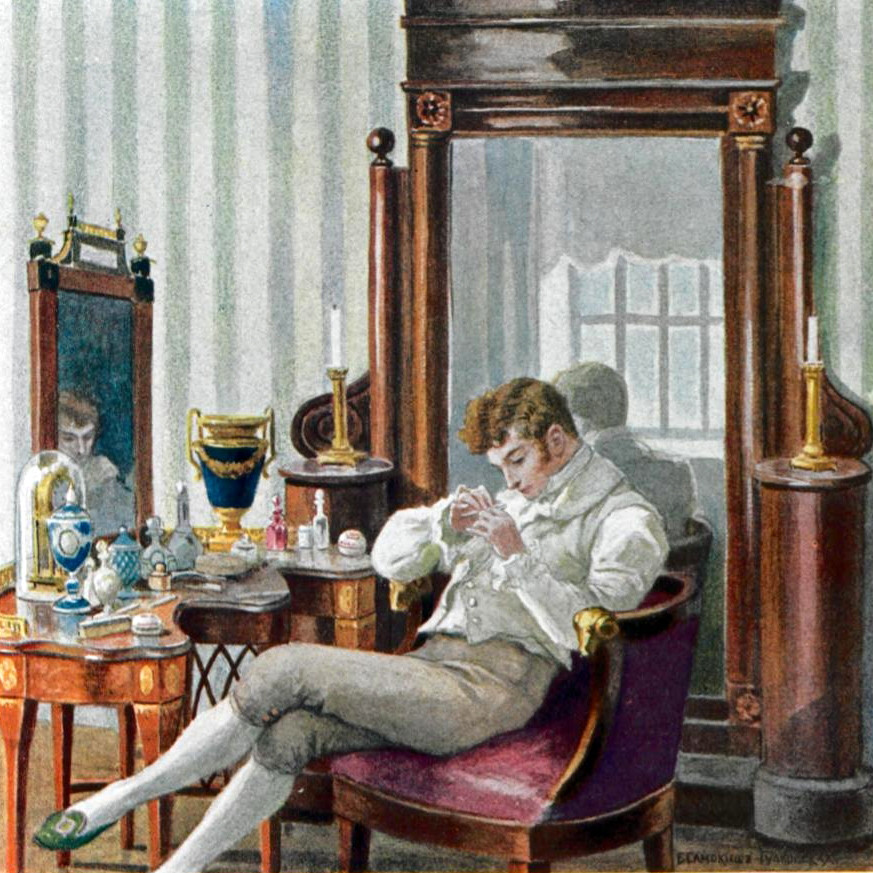
Eugene Onegin is rightly called an encyclopedia of Russian 19th century life.
Elena Samokich-Soudkovskaïa
By far the brightest star in Russian poesy,Alexander Pushkinpioneered the genre of novel in verse, all-time exemplified by his brilliant piece of work, Eugene Onegin. This is the story of the unfortunate romance between Onegin, a bon vivant satiated and tired of life, and the small-scale country girl, Tatyana. She is waiting for a human to fall in love with, simply Onegin at first doesn't take her seriously. Pushkin spends much time describing Russian culture, history and traditions. The novel is rightly called an encyclopedia of Russian nineteenthursday century life, and to this mean solar day it remains dear to Russians from the primeval ages. The nigh vital elements include Tatyana's famous letter to Onegin, descriptions of Moscow, words dedicated to the country's natural beauty, and the author's sense of humour and self-irony.
iv. A Hero of Our Time, by Mikhail Lermontov
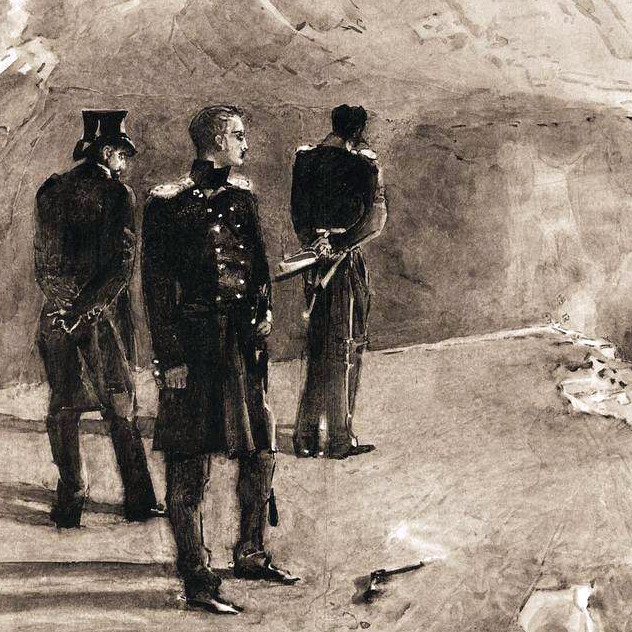
A highly educated member of Russian aristocratic lodge, Pechorin is cynical, nihilistic and melancholic.
Mikhail Vrubel
This is the story of Grigoriy Pechorin, a Russian officer traveling and serving in the Caucasus region. This bon vivant created by Russian poet and writer,Mikhail Lermontov, joins the gallery of 'superfluous man' of xixthursday century Russian literature that began with Pushkin'southward Eugene Onegin. A highly educated member of Russian aristocratic club, Pechorin is cynical, nihilistic and melancholic. He has no purpose in life, and plays with death, seeing other people as provender for brutal experiments and hedonistic joy. Lermontov'southward hero was later joined past many other such characters in 19th century literature. Along with Pushkin, Lermontov is considered one of Russia's greatest poets.
5. Dead Souls, by Nikolai Gogol
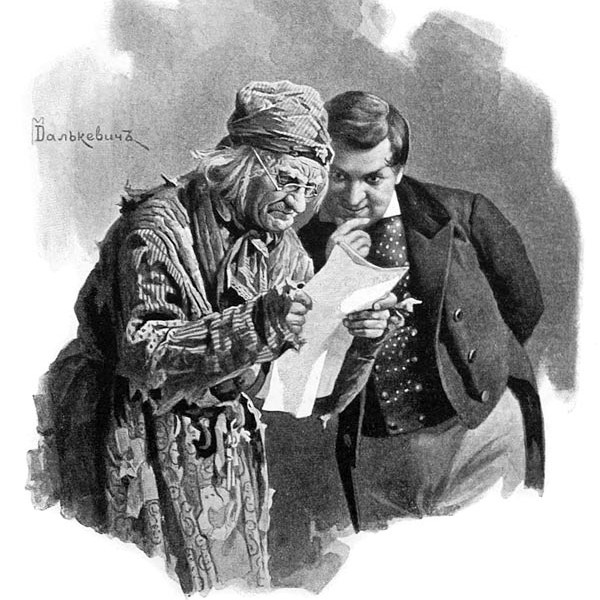
Chichikov's travels explore the reality of 19th century Russian state life and the types of people living there.
Mechislav Dalkevich
Dead Souls pastNikolai Gogolis i of the most powerful works of xixthursday century Russian literature. The author, all the same, burned the sequel and soon died of mental illness. At that place is a legend that Gogol got the thought for his novel from Alexander Pushkin. The story is virtually the poor nobleman, Pavel Chichikov, who travels the land to buy serfs who only exist on paper, and and so to perpetrate a financial scam by mortgaging the dead serfs as if they were alive; then he plans to take out a banking concern loan, and run with the coin. Chichikov'southward travels explore the reality of 19thursday century Russian country life and the types of people living at that place.
half-dozen. Criminal offense and Penalty, by Fyodor Dostoyevsky
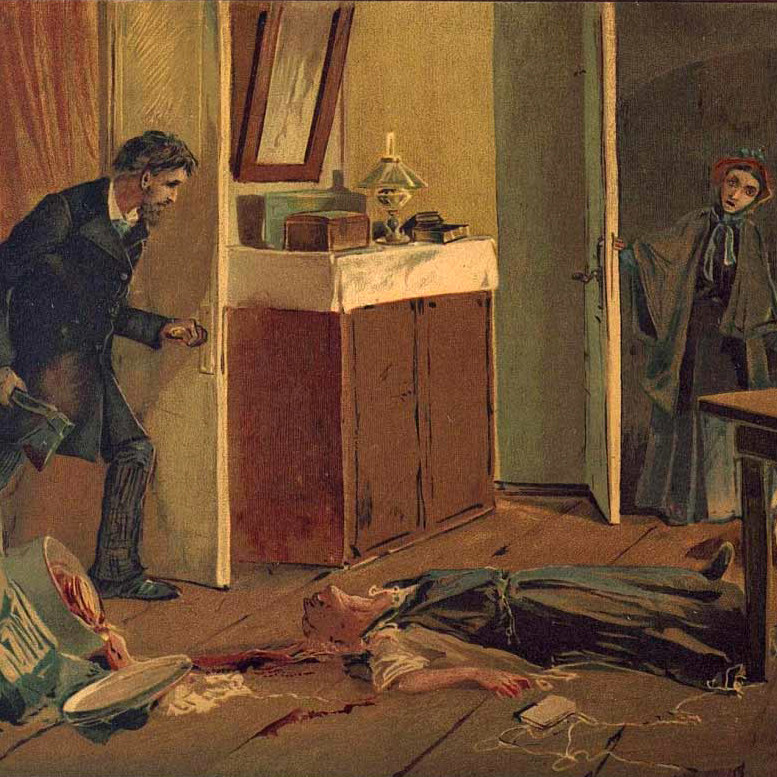
Rodion Raskolnikov grapples with the question of whether or non he's "a trembling beast," and "has the right" to kill.
North.N.Kazarin
With more 25 pic adaptations around the globe, Crime and Punishment is probably the about famous volume byFyodor Dostoyevsky. The story centers on a old student'southward moral dilemma. Rodion Raskolnikov grapples with the question of whether or not he'south "a trembling creature," and "has the correct" to kill. He compares himself to Napoleon and thinks that proficient intentions tin can justify any crime. He kills an erstwhile woman who is a moneylender, and and so surrenders to law as a result of his moral anguish. Today in St. Petersburg, where the novel takes identify, there are numerous tours dedicated to Raskolnikov's life. He is nevertheless very much a part of the city's cloth.
vii. State of war and Peace, by Leo Tolstoy
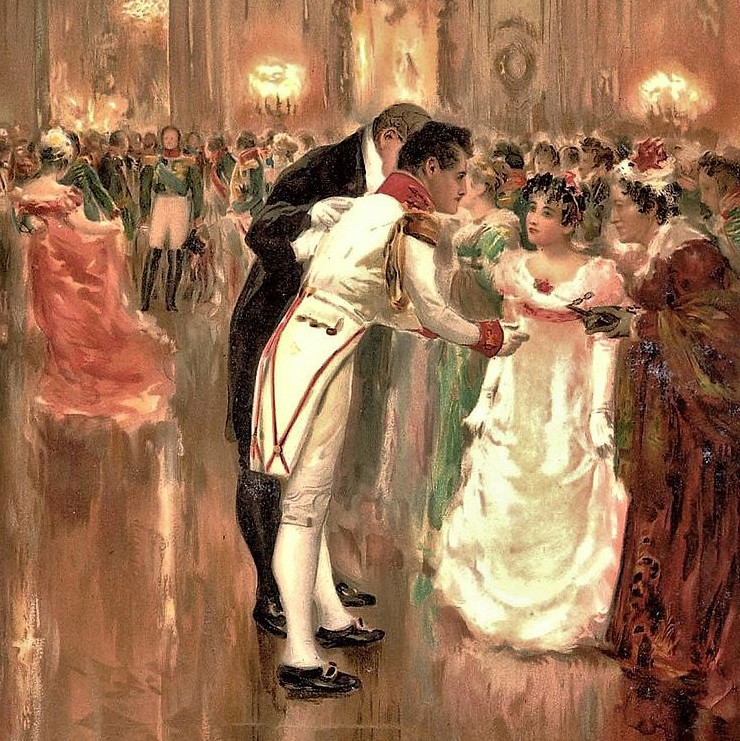
The meeting of Andrei and Natasha at the ball is one of the central scenes of War and Slice.
Fifty. Pasternak
Probably not many Russians take managed to stop all four volumes of War and Peace, whose first pages were written in French. Still, almost everyone returns to it at a afterwards age. Some prefer the lines about dear, while others enjoy the descriptions of the state of war against Napoleon in 1805—1812. Without a doubt War and Peace is one of the about important books in Russian and world literature. In Soviet times it was the country's most published, with more than than 360 million copies printed in 312 editions.
eight. Short Stories by Anton Chekhov
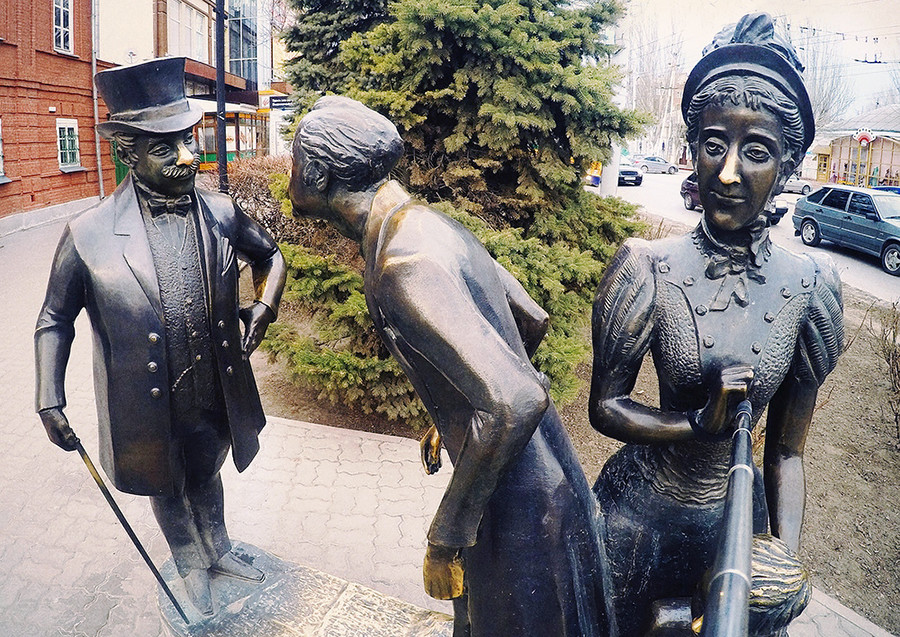
Sculptural composition Thick and thin past D. Begalov in Taganrog.
Anton Bakaruk
Russians brainstorm to readChekhov's short stories in the earliest grades. Every bit the endearing story of a dog devoted to its master, Kashtankatouched many children's hearts. Funny, short, full of humor, irony and satire, Chekhov's stories have e'er been loved by both schoolchildren and adults in Russia. Amid these are Ionych, Fat and Thin, and Little Trilogy. Chekhov'south dramas - The Seagull, Uncle Vanya, Three Sisters, and The Ruby-red Orchard - are frequently studied afterwards, usually in loftier schoolhouse.
ix. And Quiet Flows the Don, by Mikhail Sholokhov
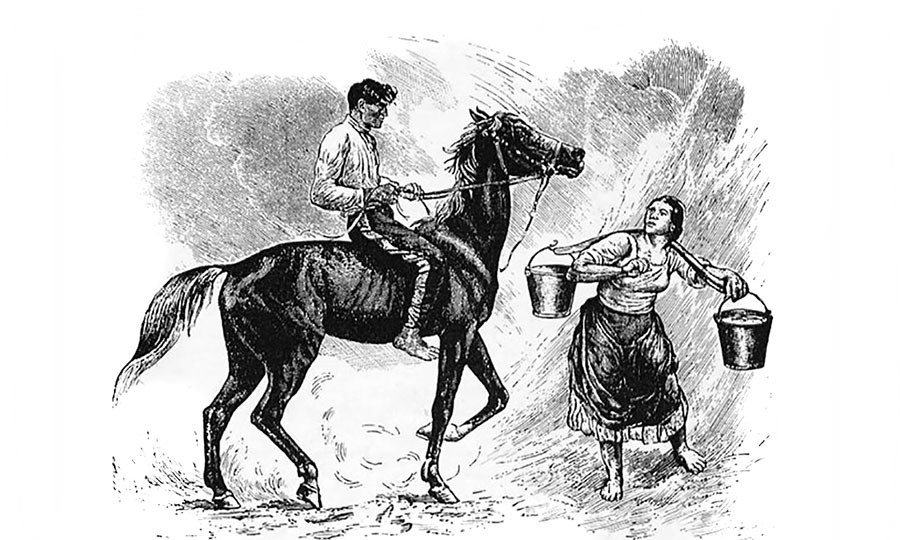
Authorship of this book, for which Mikhail Sholokhov won the Nobel Prize in literature in 1965, is still debated by literary critics.
Due south.Korolkov
Authorship of this volume, for which Mikhail Sholokhov won the Nobel Prize in literature in 1965, is still debated by literary critics. Some say information technology's not possible for a 22-year-old to write such an exceptional piece of work at such a young age. Sholokhov's handwritten drafts were long lost, which is rather foreign considering the novel'due south importance and length. Some experts argue that the novel was written by Fyodor Kryukov, a White Ground forces officer. Any the truth, this book about the destiny of a man at the fourth dimension of the Russian Revolution, describing the life of the Don Cossacks, is one of the about significant books of 20thursday century Russian literature.
10. One Day in the Life of Ivan Denisovich, by Alexander Solzhenitsyn
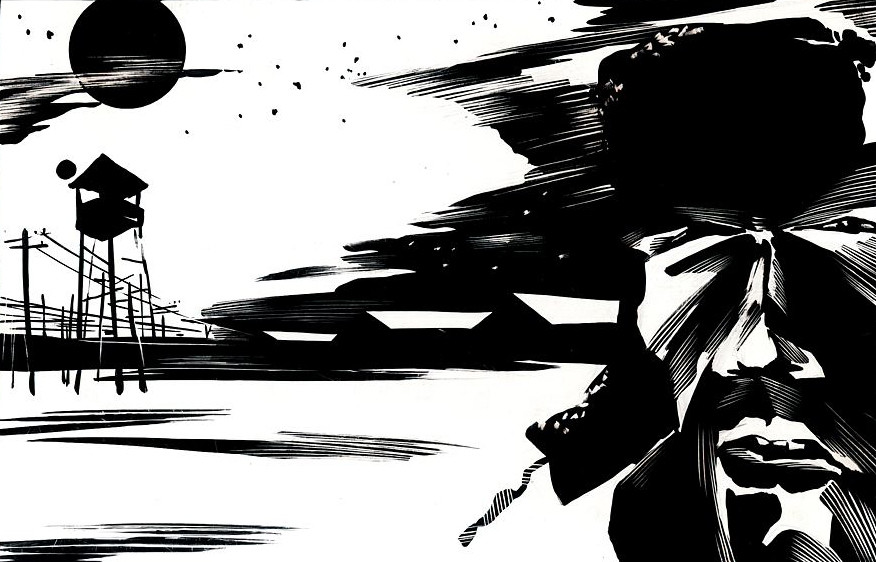
The volume tells the story of ane day in the life of Ivan Denisovich Shukhov, a prisoner in a Soviet labor camp in the 1950s.
O.Besedin
The writings of some other Nobel Prize winner (1970), Alexander Solzhenitsyn, were long prohibited in Russian schools. This author's short stories and novels began to appear at schools only during Perestroika, in the cease of the 1980s. They became the most damning bear witness of Soviet repressions. One Day in the Life of Ivan Denisovich, first published in 1962, at present occupies a primal identify in the study of 20thursdaycentury literature in every high schoolhouse class. The volume tells the story of ane day in the life of Ivan Denisovich Shukhov, a prisoner in a Soviet labor camp in the 1950s. The book'southward publication was boggling because it was the first time that Stalin's repressions were openly described.
Now that you have a taste of Russian literature, have a look at our rating of the greatest national writers of all time.
If using whatever of Russia Beyond's content, partly or in total, always provide an active hyperlink to the original material.
Get the week'due south best stories directly to your inbox
Source: https://www.rbth.com/arts/326951-10-russian-literary-masterpieces
0 Response to "How Can Today Be Compared to the Day of the Book of Esther"
Post a Comment